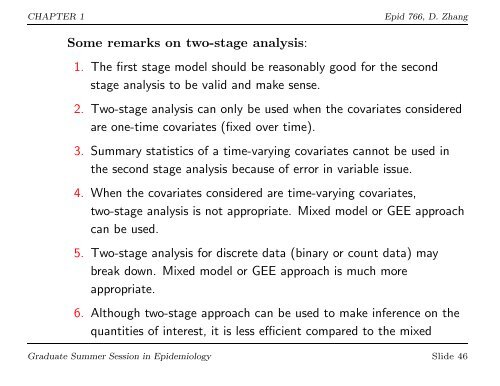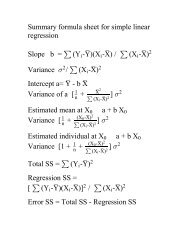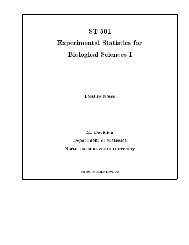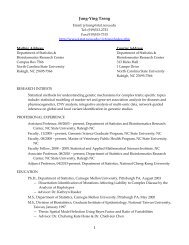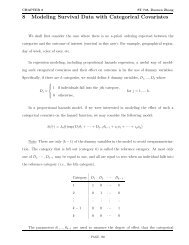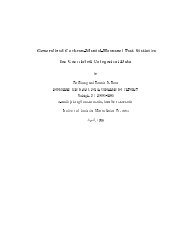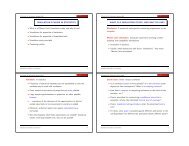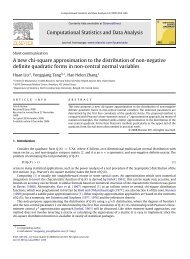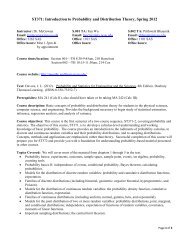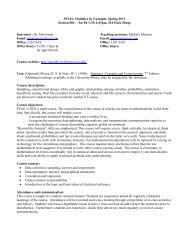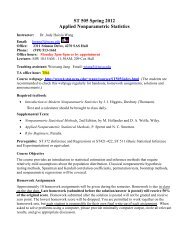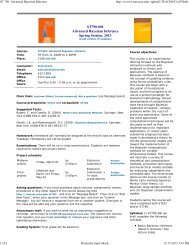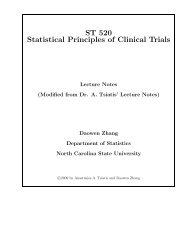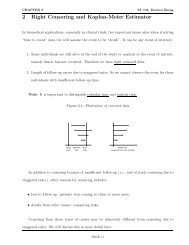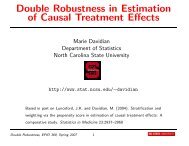- Page 1 and 2: Epid 766 D. Zhang EPID 766: Analysi
- Page 3 and 4: TABLE OF CONTENTS Epid 766, D. Zhan
- Page 5 and 6: CHAPTER 1 Epid 766, D. Zhang 1 Revi
- Page 7 and 8: CHAPTER 1 Epid 766, D. Zhang • Gi
- Page 9 and 10: CHAPTER 1 Epid 766, D. Zhang 3. Ret
- Page 11 and 12: CHAPTER 1 Epid 766, D. Zhang 1.2 In
- Page 13 and 14: CHAPTER 1 Epid 766, D. Zhang A glim
- Page 15 and 16: CHAPTER 1 Epid 766, D. Zhang What w
- Page 17 and 18: CHAPTER 1 Epid 766, D. Zhang Propor
- Page 19 and 20: CHAPTER 1 Epid 766, D. Zhang Epilep
- Page 21 and 22: CHAPTER 1 Epid 766, D. Zhang Compar
- Page 23 and 24: CHAPTER 1 Epid 766, D. Zhang Then y
- Page 25 and 26: CHAPTER 1 Epid 766, D. Zhang 1.6 Ch
- Page 27 and 28: CHAPTER 1 Epid 766, D. Zhang For j
- Page 29 and 30: CHAPTER 1 Epid 766, D. Zhang 2. Ser
- Page 31 and 32: CHAPTER 1 Epid 766, D. Zhang 1.8 Tw
- Page 33 and 34: CHAPTER 1 Epid 766, D. Zhang 1.9 An
- Page 35 and 36: CHAPTER 1 Epid 766, D. Zhang Part o
- Page 37 and 38: CHAPTER 1 Epid 766, D. Zhang Sample
- Page 39 and 40: CHAPTER 1 Epid 766, D. Zhang SAS pr
- Page 41 and 42: CHAPTER 1 Epid 766, D. Zhang Variab
- Page 43 and 44: CHAPTER 1 Epid 766, D. Zhang Regres
- Page 45: CHAPTER 1 Epid 766, D. Zhang After
- Page 49 and 50: CHAPTER 2 Epid 766, D. Zhang 2.1 Wh
- Page 51 and 52: CHAPTER 2 Epid 766, D. Zhang Random
- Page 53 and 54: CHAPTER 2 Epid 766, D. Zhang Why tr
- Page 55 and 56: CHAPTER 2 Epid 766, D. Zhang II. Ra
- Page 57 and 58: CHAPTER 2 Epid 766, D. Zhang subjec
- Page 59 and 60: CHAPTER 2 Epid 766, D. Zhang III. O
- Page 61 and 62: CHAPTER 2 Epid 766, D. Zhang 4. Uns
- Page 63 and 64: CHAPTER 2 Epid 766, D. Zhang Genera
- Page 65 and 66: CHAPTER 2 Epid 766, D. Zhang 2.2 Es
- Page 67 and 68: CHAPTER 2 Epid 766, D. Zhang 2.3 Ho
- Page 69 and 70: CHAPTER 2 Epid 766, D. Zhang ⋆ Mo
- Page 71 and 72: CHAPTER 2 Epid 766, D. Zhang ⋆ Th
- Page 73 and 74: CHAPTER 2 Epid 766, D. Zhang The Mi
- Page 75 and 76: CHAPTER 2 Epid 766, D. Zhang 220.69
- Page 77 and 78: CHAPTER 2 Epid 766, D. Zhang • Mo
- Page 79 and 80: CHAPTER 2 Epid 766, D. Zhang where
- Page 81 and 82: CHAPTER 2 Epid 766, D. Zhang AICC (
- Page 83 and 84: CHAPTER 2 Epid 766, D. Zhang the lo
- Page 85 and 86: CHAPTER 2 Epid 766, D. Zhang ⋆ Si
- Page 87 and 88: CHAPTER 2 Epid 766, D. Zhang ⋆ Pa
- Page 89 and 90: CHAPTER 2 Epid 766, D. Zhang Soluti
- Page 91 and 92: CHAPTER 2 Epid 766, D. Zhang 6. �
- Page 93 and 94: CHAPTER 2 Epid 766, D. Zhang ⋆ Es
- Page 95 and 96: CHAPTER 2 Epid 766, D. Zhang ⋆ Th
- Page 97 and 98:
CHAPTER 2 Epid 766, D. Zhang ⋆ In
- Page 99 and 100:
CHAPTER 2 Epid 766, D. Zhang ⋆ No
- Page 101 and 102:
CHAPTER 2 Epid 766, D. Zhang UN(2,1
- Page 103 and 104:
CHAPTER 2 Epid 766, D. Zhang • No
- Page 105 and 106:
CHAPTER 2 Epid 766, D. Zhang title
- Page 107 and 108:
CHAPTER 2 Epid 766, D. Zhang What w
- Page 109 and 110:
CHAPTER 2 Epid 766, D. Zhang Ways t
- Page 111 and 112:
CHAPTER 2 Epid 766, D. Zhang title
- Page 113 and 114:
CHAPTER 3 Epid 766, D. Zhang 3 Mode
- Page 115 and 116:
CHAPTER 3 Epid 766, D. Zhang while
- Page 117 and 118:
CHAPTER 3 Epid 766, D. Zhang exampl
- Page 119 and 120:
CHAPTER 3 Epid 766, D. Zhang model
- Page 121 and 122:
CHAPTER 3 Epid 766, D. Zhang One si
- Page 123 and 124:
CHAPTER 3 Epid 766, D. Zhang 3. The
- Page 125 and 126:
CHAPTER 3 Epid 766, D. Zhang Cov Pa
- Page 127 and 128:
CHAPTER 3 Epid 766, D. Zhang What w
- Page 129 and 130:
CHAPTER 3 Epid 766, D. Zhang Design
- Page 131 and 132:
CHAPTER 3 Epid 766, D. Zhang • An
- Page 133 and 134:
CHAPTER 3 Epid 766, D. Zhang Commen
- Page 135 and 136:
CHAPTER 4 Epid 766, D. Zhang 4 Mode
- Page 137 and 138:
CHAPTER 4 Epid 766, D. Zhang (not c
- Page 139 and 140:
CHAPTER 4 Epid 766, D. Zhang give u
- Page 141 and 142:
CHAPTER 4 Epid 766, D. Zhang will g
- Page 143 and 144:
CHAPTER 4 Epid 766, D. Zhang • Co
- Page 145 and 146:
CHAPTER 4 Epid 766, D. Zhang • A
- Page 147 and 148:
CHAPTER 4 Epid 766, D. Zhang • Vi
- Page 149 and 150:
CHAPTER 4 Epid 766, D. Zhang 3. AR(
- Page 151 and 152:
CHAPTER 4 Epid 766, D. Zhang • In
- Page 153 and 154:
CHAPTER 4 Epid 766, D. Zhang option
- Page 155 and 156:
CHAPTER 4 Epid 766, D. Zhang Criter
- Page 157 and 158:
CHAPTER 4 Epid 766, D. Zhang Some r
- Page 159 and 160:
CHAPTER 4 Epid 766, D. Zhang • In
- Page 161 and 162:
CHAPTER 4 Epid 766, D. Zhang Class
- Page 163 and 164:
CHAPTER 4 Epid 766, D. Zhang Second
- Page 165 and 166:
CHAPTER 4 Epid 766, D. Zhang Algori
- Page 167 and 168:
CHAPTER 4 Epid 766, D. Zhang Criter
- Page 169 and 170:
CHAPTER 4 Epid 766, D. Zhang 4.2 Ge
- Page 171 and 172:
CHAPTER 4 Epid 766, D. Zhang indivi
- Page 173 and 174:
CHAPTER 4 Epid 766, D. Zhang • Ex
- Page 175 and 176:
CHAPTER 4 Epid 766, D. Zhang ⋆ On
- Page 177 and 178:
CHAPTER 4 Epid 766, D. Zhang • Fo
- Page 179 and 180:
CHAPTER 4 Epid 766, D. Zhang • Im
- Page 181 and 182:
CHAPTER 4 Epid 766, D. Zhang that i
- Page 183 and 184:
CHAPTER 4 Epid 766, D. Zhang • Re
- Page 185 and 186:
CHAPTER 4 Epid 766, D. Zhang SAS ou
- Page 187 and 188:
CHAPTER 4 Epid 766, D. Zhang Iterat
- Page 189 and 190:
CHAPTER 4 Epid 766, D. Zhang • Re
- Page 191 and 192:
CHAPTER 4 Epid 766, D. Zhang 4.4 An
- Page 193 and 194:
CHAPTER 4 Epid 766, D. Zhang option
- Page 195 and 196:
CHAPTER 4 Epid 766, D. Zhang Dimens
- Page 197 and 198:
CHAPTER 4 Epid 766, D. Zhang • Re
- Page 199 and 200:
CHAPTER 4 Epid 766, D. Zhang The re
- Page 201 and 202:
CHAPTER 4 Epid 766, D. Zhang The re


